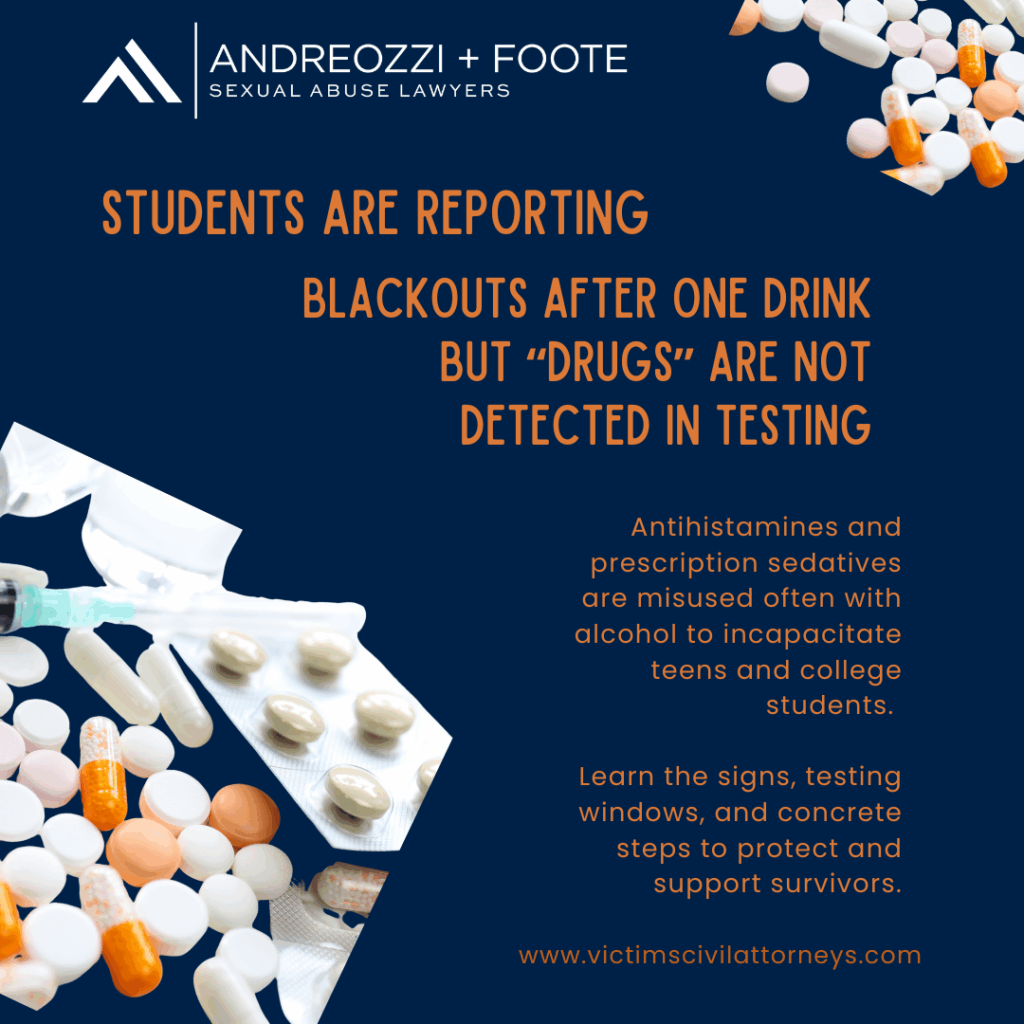Drug-facilitated sexual assault (DFSA) doesn’t only involve “mystery club drugs.” Common prescription medications (like benzodiazepines) and even familiar over-the-counter (OTC) products (like first-generation antihistamines) can be misused to sedate, disorient, and erase memory especially when combined with alcohol. Knowing the warning signs, testing timelines, and practical safety steps can help you respond fast and support survivors with dignity and care.
At a recent national convening of Title IX coordinators, many have lamented how students are reporting having one drink and then blacking out. However, when they go to the hospital for toxicology testing, nothing comes up. That is because traditional “date rape” drugs aren’t being used.
What is drug-facilitated sexual assault (DFSA)?
DFSA occurs when someone uses alcohol and/or another substance to incapacitate a person so they cannot consent. Many drugs alone or combined can impair movement, decision-making, and memory. Alcohol is by far the most common substance in these cases; sedatives (especially benzodiazepines) and antihistamines also appear frequently.
The “silent” drugs you might not expect
When people hear “date-rape drug,” they often think GHB, Rohypnol (flunitrazepam), or ketamine. Those do show up. But recent forensic and medical literature highlights sedating OTC and prescription meds as well:
- Benzodiazepines (e.g., alprazolam/Xanax®, clonazepam/Klonopin®): potent amnesia/sedation; short blood/urine detection windows (often hours to a few days).
- First-generation antihistamines (e.g., diphenhydramine/Benadryl®, doxylamine): widely available; cause significant sedation identified in U.S. DFSA case series at notable rates (e.g., diphenhydramine present in some datasets). Mixing with alcohol compounds impairment.
- Dextromethorphan (DXM) (many cough syrups): dissociative effects at high doses; often combined with other sedating ingredients.
- GHB/GBL and ketamine: powerful sedation/amnesia; GHB clears fast (often 12 hours in urine), which is why timely testing matters.
Bottom line: familiar medications especially when slipped into alcoholic drinks can be weaponized to incapacitate someone and wipe memory of the assault.
What the numbers say about drug facilitated rape
- On U.S. campuses, more than 1 in 13 students reported being drugged (or suspect being drugged) in a multi-campus study; 1.4% admitted drugging someone. Among those drugged, unwanted sexual touching and forced sex were reported outcomes.
- Among high-schoolers, recent national data show concerning levels of sexual violence, with girls and LGBTQ+ youth at elevated risk context that makes DFSA prevention and response urgent in teen settings, too.
- Toxicology often misses DFSA because many drugs metabolize quickly and standard ER drug screens may not include them (e.g., GHB isn’t on routine panels). Rapid, targeted collection is crucial.
If you think you or a friend was drugged
- Get to safety and get medical care immediately. Ask for a sexual assault medical forensic exam (SANE exam). You do not have to decide about police reporting to get an exam.
- Request DFSA toxicology right away.
- Urine sample ASAP (ideally at the hospital). Some protocols collect up to 96 hours post-ingestion, but earlier is best.
- Blood sample may help if within hours. Explain why you suspect drugging so targeted tests (e.g., LC–MS/MS for benzos, GHB) are ordered. Routine screens can miss GHB/others.
- Try not to urinate, eat, or drink more before giving a sample if possible. If you already did, go anyway; care and evidence may still be available. (Survivor health comes first.)
- Save potential evidence (clothes, cups, texts, rideshare receipts) and document symptoms (time you felt “off,” vomiting, sudden drowsiness, memory gaps).
- Connect with a confidential advocate. You deserve trauma-informed care and someone in your corner. RAINNoperates a 24/7 hotline at 800-656-HOPE and online chat.
Why speed matters: testing windows at a glance
- GHB: usually detectable blood and in urine; hair testing can help later but is specialized.
- Benzodiazepines: variable; many are in blood and in urine (some shorter/longer depending on the drug).
Practical safety tools for students
Please note these are just suggestions, they are not fool proof and it is NEVER THE VICTIMS FAULT. Nor should the burden be placed on the would be victim.
- Buddy system & boundaries: arrive together, leave together, check-ins via text, and non-negotiable consent culture in your friend group.
- Drink safety basics: open/mix your own drinks, watch your cup (or cap it), don’t share or accept already-opened containers, and trust your body if a buzz feels “wrong for the amount you drank.”
- Detection products (test strips, straws, napkins) can catch some drugs (often ketamine/GHB) but won’t detect everything, including many benzos or antihistamines; a “negative” isn’t proof you weren’t drugged. Use them as one tool not your only protection.
- If someone suddenly seems far more intoxicated than expected (slurred speech, ataxia, vomiting, “lights out” sleep): treat it as a medical emergency and get help.
What parents can do right now
- Have the consent + substance conversation early and often (high school and college). Share that sexual violence is never the victim’s fault, including when substances are involved.
- Role-play scenarios: How to leave a party safely; how to step in as a bystander; what to do if a friend seems “off.” Evidence shows coordinated, trauma-informed responses support healing and accountability.
- Create an “anytime call” plan: No-questions-asked rides, campus safety numbers in favorites, and a code word to signal “I need help.”
- Know the timelines: If DFSA is suspected, seek care immediately and request targeted toxicology (not just a “standard drug screen”).
If you’re a campus or community professional
- Build and train a Sexual Assault Response Team (SART) to coordinate law enforcement, advocates, clinicians, and forensic labs on DFSA protocols, including rapid specimen collection.
- Align with national sexual assault medical forensic protocols to ensure survivor-centered care that preserves options regardless of immediate reporting decisions.
You’re not alone
If you or someone you love has experienced a drug-facilitated rape or assault, confidential help is available through our trauma-informed intake office and lawyers. 1-866-753-5458


